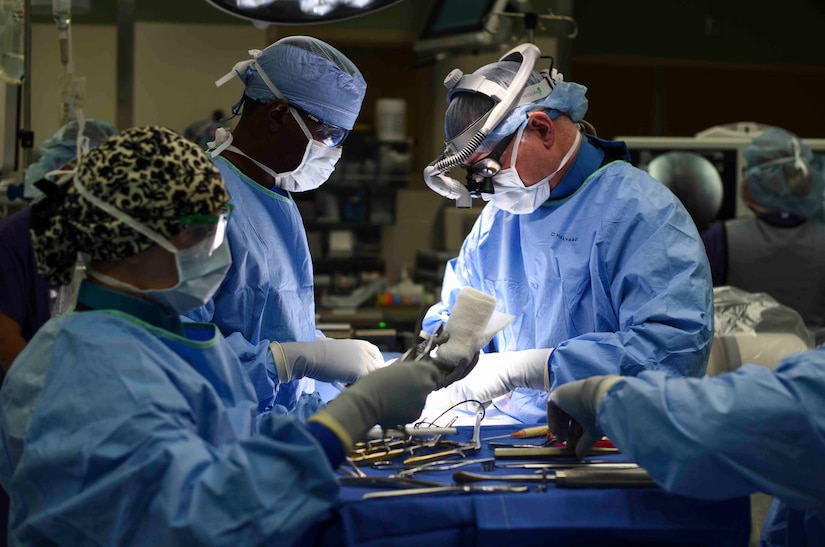By Air Force Airman 1st Class Andrew Sarver, 99th Air Base
Wing
NELLIS AIR FORCE BASE, Nev. -- The 99th Medical Group based
at Mike O’Callaghan Medical Center here successfully completed its first set of
orthopedic spine surgeries after bringing two specialized surgeons to the unit.
As one of the more limited Air Force Medical Service
specialties, orthopedic spine surgery has only three qualified surgeons in the
entire Air Force, two of whom are now on the team at the medical center here.
Air Force Col. (Dr.) Edward Anderson and Air Force Maj.
(Dr.) Bryan Lawson, 99th MDG orthopedic spine surgeons, bring a combined nearly
three decades of surgical experience to the operating table. Their goal is to
increase capabilities inside the hospital as well as increase individual
deployment readiness.
“We understood that we had a significant amount of spine
surgery cases that were being referred to physicians downtown,” said Air Force
Col. (Dr.) Kim Pietszak, 99th MDG medical staff chief. “After doing the math,
it became pretty apparent to us that we should be providing this care inside of
our facility and could do it for less cost to the government.”
Increasing Medical Readiness
Pietszak said the benefits of performing complex surgeries
in the orthopedic spine clinic go far beyond the operating room because each
surgery requires a great deal of preparation.
Prepping those patients increases everyone’s medical
readiness, she explained, with the nurses admitting the patients, the
technicians doing lab work and everyone else involved in the process soaking up
the knowledge from their environment.
Pietszak said this clinic is a big win for the Air Force and
for Nellis. Not only will the care providers be able to take care of the airmen
in their facility, she added, but now they are able to monitor them closer and
better gauge when they are able to return to work, improving the airmen and
their readiness.
Both Lawson and Anderson are optimistic for the future of
orthopedic spine surgery at Nellis.
“I think we have to start with procedures that are fairly
straightforward,” Lawson said. “But the goal is to provide the full complement
of spine care here.”
“When you’re setting up a complex spine program, you want to
grow this in a deliberate way in order to continue to deliver safe care,”
Anderson said.
“The reality of it is that we get to a point where we’re in
such a specialized field that who I needed wasn’t just another surgeon,”
Anderson added. “They told me they needed complex spine surgery done here. I
told them I needed Dr. Lawson because it’s a team sport -- you can’t do it
alone.”
Lawson and Anderson have known each other for nearly a
decade, and their complementary work ethics are key for Nellis to enhance the
99th MDG’s readiness as a unit.
Having a Good Team
“Half the battle when performing surgery is having a good
team,” Lawson said. “There’s so much the institution is capable of providing,
but what can almost dwarf all of that is when you’re starting to build a team
and how the interaction with your colleagues is. Thankfully, it’s something
that has already been sorted out for Dr. Anderson and I over a course of years
from working together.”
This also gives other orthopedic surgeons here, who aren’t
traditionally spine surgeons, the ability to scrub-in, or assist, on a spine
case and learn some of the skill sets from Anderson and Lawson.
“Setting up spine surgery here doesn’t have anything to do
with our surgical readiness, because when we deploy, we deploy as general
orthopedic surgeons -- not spine surgeons,” Anderson said.” Maintaining our
airmen’s readiness all has to do with what follows on with our service line. It
keeps the nurses on their toes in the intensive care unit and the technicians
trained in the lab, among many other roles that are played to keep a hospital
running.”








No comments:
Post a Comment